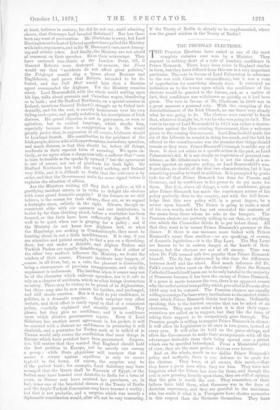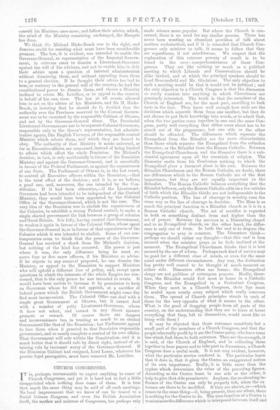THE PRUSSIAN ELECTIONS.
THE Prussian Elections have ended in one of the most complete victories ever won by a Minister. They amount to nothing short of a vote of absolute confidence in Prince Bismarck. There have been votes in England similar in form, but they have differed from this one in a very important particular. The vote in favour of Lord Palmerston in reference to the war with China was extraordinary, but it was a vote of approbation for something already done. It conveyed no indication as to the terms upon which the confidence of the electors would be granted in the future, and, as a matter of fact, that confidence was withdrawn as quickly as it had been given. The vote in favour of Mr. Gladstone in 1868 was in a great measure a personal .vote. With the exception of the disestablishment of the Irish Church, no one knew very clearly what he was going to do. The electors were content to know that, whatever it might be, it was he who was going to do it. The vote in favour of Lord Beaconsfield in 1874 was rather a demon- stration against the then existing Government, than a welcome given to the coming Government. Lord J3eac6nsfield made the sin of the Liberals to consist in doing too much, and the bait he offered to the constituencies was the promise that things should remain as they were. Prince Bismarck's triumph is unlike any of these. It does not relate to a specific action in the past, as Lord Palmerston's did. It is not simply an expression of personal con- fidence, as Mr. Gladstone's was. It is not the result of a re- action against an opposite policy, as Lord Beaconsfield's was. It partakes, no doubt, of the first two characteristics, but it has something peculiar to itself in addition. It is prompted by grati- tude for all that Prince Bismarck has done for Prussia and Germany, and by confidence in his power to do yet more for them. But it is, above all things, a vote of confidence, given after Prince Bismarck has made the reactionary pature of his policy perfectly clear to the country, and with the full know- ledge that this new policy will, in a great degree, be a return. upon himself. The Prince is going to make a meal of his own words, and he has not concealed the contents of the menu from those whom he asks to the banquet. The Prussian electors are perfectly willing to eat that, or anything else. which the Chancellor thinks fit to put before them. All that they want is to secure Prince Bismarck's presence at the dinner. If there is one measure more linked with Prince Bismarck's name than another—we are speaking, of course, of domestic legislation—it is the May Laws. The May Laws are known to be in serious danger at the hands of their creator,.but the electors are not at all uneasy. Time was when Dr. Falk 'seemed only less popular than Prince Bismarck himself. The fly has discovered by this time the difference between itself and the wheel. How much influence did Dr. Falk's recent letter exert on the elections ? Even the Roman Catholic Church itself turns out to be only hateful to the majority of Prussians because it has been the enemy of Prince Bismarck. If a peace is made between the two, there is no apparent reason why the ecclesiastical tranquillity which prevailed in Prussia after 1848 may not be restored. The Prussian electors are equally willing to consign Parliamentary institutions to the Modest retire- ment which Prince Bismarck thinks best for them. Ordinarily speaking, this is the hardest sacrifice that can be asked of an electorate. They may not mind what it is that their repre- sentatives are called on to support, but they like the form of asking their support to bo scrupulously gone through. The Prussian people is willing to support Prince Bismarck in silence. It will allow its Legislature to sit once in two years, instead of every year. It will relax its hold on the purse-strings, and allow the Government to make their arrangements with all the advantages derivable from their being spread over a period which can be specified beforehand. From a Ministerial point of view, they are the most perfect electors ever known.
And on the whole, much as we dislike Prince Bismarck's policy and motkods, there is ono defence to be made for the electors. ley have, at all events, this merit,—that they know a great man when they see him. They have not forgotten what the Prince has done for them, and though the cost is now pressing heavily upon them, they are still of opinion that the gain is worth the cost. They remember, or their fathers have told them, what Germany was in the days of Austrian supremacy, and they are grateful to the statesman who has made it what it is. Foreigners have shorter memories in this respect than the Germans themselves. They have consult his Ministers once more, and follow their advice, which, the mind of the Ministry remaining unchanged, the Marquis has done.
We think Sir Michael Hicks-Beach was in the right, and deserves credit for resisting what must have been considerable pressure. The law, it is evident, was intended to enable the Governor-General, as representative of the Imperial Govern- ment, in extreme cases to dismiss a Lieutenant-Governor against the will of his advisers, and not to enable him to defy their advice upon a question of internal administration without dismissing them, and without appealing from them to a general election. If he thought their advice too bad to bear, or contrary to the general will of the country, he had the constitutional power to dismiss them, and choose a Ministry inclined to retain Mr. Letellier, or to appeal to the country in behalf of his own view. The law at all events allowed him to act on the advice of his Ministers, and Sir M. Hicks,• Beach, in insisting that he should do it, decided that the authority over the Provinces reserved to the Central Govern- ment was to be exercised by the responsible Cabinet of Ottawa, and not by the Governor-General alone. The Provincial Lieutenant-Governors are not to be separate Colonial Governors, responsible only to the Queen's representative, but adminis- trative agents, like English Viceroys, of the responsible central Ministry which selects them, and which they arc bound to obey. The authority of that Ministry is made universal, as far as Executive officers are concerned, instead of being limited to affairs which affect the whole Dominion. Sir Michael's decision, in fact, is only accidentally in favour of the Dominion Ministry and against the Governor-General, and is essentially in favour of the Federal Parliament, as against the separateness of any State. The Parliament of Ottawa is, in the last resort, to control all Executive officers within the Dominion,—that is the total effect of the decision ; and it is, as we believe, a good one, and, moreover, the one intended by the Con- stitution. If it had been otherwise,—if the Lieutenant- Governors had been intended to be independent of the Central Ministry, they would have been appointed by the Colonial Office or the Governor-General, which is not the case. The very idea of the Dominion was to abolish the separateness of the Colonies, to establish a strong Federal control, to make a single elected government the link between a group of colonies and Great Britain. Itis folly, having created that Government, to weaken it again in favour of the Colonial Office, whose agent the Governor-General is, or in favour of that separateness of the Colonies which it was intended to abolish. Some of our con- temporaries seem to think that the power of the Governor- General has received a shock from Sir Michael's decision, but nothing of the kind has occurred. His power is just where it was, the only difference being he must re- move four or five more officers, if his Ministers so advise. If he objects to any removal proposed, he can dismiss the Ministry, or appeal to the Dominion to support Ministers who will uphold a different line of policy, and, except upon questions in which the interests of the whole Empire are con- cerned, that is the only power he was intended to retain. It would have been useless to increase it by permission to keep on Governors whom he did not appoint, at a sacrifice of• federal power which the British Government might some day find most inconvenient. The Colonial Office can deal with a single great Government at Ottawa,, but it cannot deal with a number of . petty Lieutenant-Governors, whom it does not select, and cannot in any direct manner promote or reward. Of course there are dangers and inconveniences too, in trusting so much to an elected Government like that of the Dominion ; but Parliament agreed to face them when it granted to that Dominion responsible government, and so nearly complete a control of its own affairs. That Government will rule within the Constitution, and it is much bettor that it should rule by direct right, instead of ob- taining rule by incessant worry of the Governor-General. If the Dominion Cabinet had resigned, Lord Lorne, whatever his precise legal prerogative, must have removed Mr. Letellier.

































 Previous page
Previous page